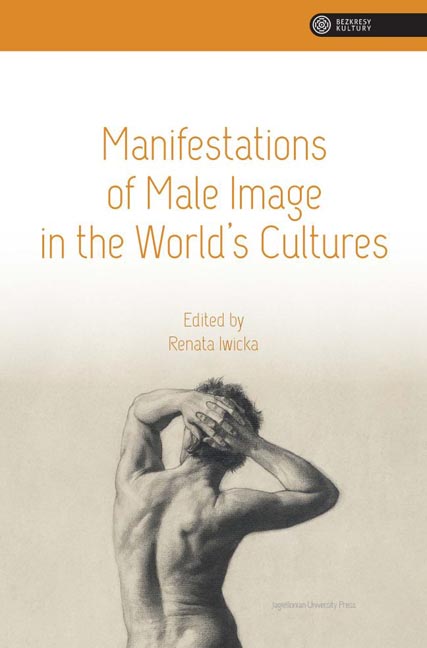Book contents
- Frontmatter
- Contents
- Preface
- “A Jewel Beyond Compare”: Prince Hikaru Genji As A Perfect Male Of The Heian Period In The Light Of Popular Culture Theories
- Cicero and Male Virtue
- Kill The Savage, Save The Man – James Welch’s Chronicle Of Native American History
- On (Self-)Representations Of Masculinity In Siyāmak Herawi’s Short Stories
- Power, Masculinity, And War: Superman, A Case Study
- Redefining New Masculinity In Korean Television Drama Series
- Stripping The Vampire. Erotic Imaginations and Sexual Fantasies In Paranormal Romances (A Study Of Selected Examples)
- The Horned God: Divine Male Principle In British Traditional Wicca
- Biographical Notes of the Authors
- Miscellaneous Endmatter
“A Jewel Beyond Compare”: Prince Hikaru Genji As A Perfect Male Of The Heian Period In The Light Of Popular Culture Theories
Published online by Cambridge University Press: 14 October 2023
- Frontmatter
- Contents
- Preface
- “A Jewel Beyond Compare”: Prince Hikaru Genji As A Perfect Male Of The Heian Period In The Light Of Popular Culture Theories
- Cicero and Male Virtue
- Kill The Savage, Save The Man – James Welch’s Chronicle Of Native American History
- On (Self-)Representations Of Masculinity In Siyāmak Herawi’s Short Stories
- Power, Masculinity, And War: Superman, A Case Study
- Redefining New Masculinity In Korean Television Drama Series
- Stripping The Vampire. Erotic Imaginations and Sexual Fantasies In Paranormal Romances (A Study Of Selected Examples)
- The Horned God: Divine Male Principle In British Traditional Wicca
- Biographical Notes of the Authors
- Miscellaneous Endmatter
Summary
Abstract: The Tale of Genji was written in the Heian period at the beginning of the 11th century by Murasaki Shikibu. The authoress, herself a lady of the Empress’ court, depicted an ideal hero – Prince Hikaru Genji – who later became a perfect male for other court ladies. This paper analyses how Genji is presented in the novel and how he was received by the readers. The main research perspective combines analysis of the text itself along with pop-culture theories (referencing, among others, Haruo Shirane, Dominic Strinati and Henry Jenkins). With such methodology, we aim to show Prince Genji within a broad perspective of Japanese culture.
Keywords: Hikaru Genji, The Tale of Genji, Murasaki Shikibu, popular culture, Heian
INTRODUCTION
It was already Yasunari Kawabata, who said that “The Tale of Genji in particular is the highest pinnacle of Japanese literature. Even down to our day there has not been a piece of fiction to compare with it. That such a modern work should have been written in the 11th century is a miracle, and as a miracle the work is widely known abroad.” The aim of this paper is to present and analyse the portrait of the main protagonist of The Tale of Genji by Murasaki Shikibu (c. 978–c. 1026). The Tale of Genji (Genji monogatari, Jpn. 源氏物語3) is often considered to be the first novel in the world, but it also remains a particularly abundant source of knowledge about the Heian period (794‒1185), during which it came into existence. The novel concentrates on the character of Prince Hikaru Genji (also called “The Shining Prince”, Japanese hikaru, 光る, means “to shine”), the son of the Emperor and the most flawless hero of all. It tells the story of his life – filled with numerous affairs – and also depicts the customs of aristocracy of the Heian period within political and sociological context (especially intrigues at the court) with remarkable descriptive realism.
In this paper we will present Genji as a popular culture hero and analyse not only the novel in which he appears for the first time, but also other texts from Heian period, as we intend to trace the reception of the protagonist in social and cultural context.
- Type
- Chapter
- Information
- Manifestations of Male Image in the World's Cultures , pp. 11 - 30Publisher: Jagiellonian University PressPrint publication year: 2021



